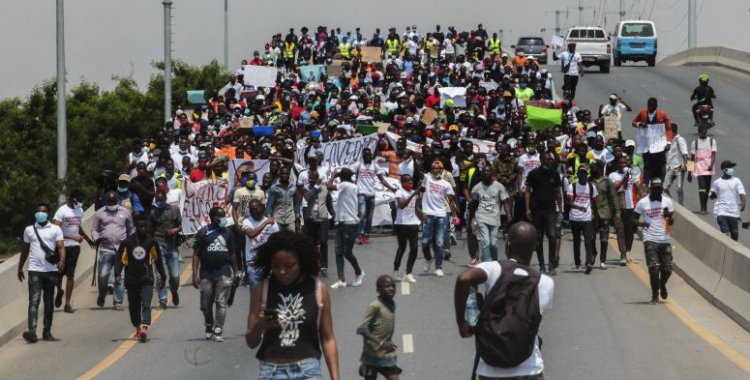Even in times of pandemic and with several restrictions established by the Angolan government in the context of the fight against Covid-19, demonstrations organized through social networks and led by young people from different social classes across the country (as well as in the diaspora), continue to occur. Angolan youth has expressed their concerns, discontent and fury over the level of police brutality, corruption, unemployment, rising cost of living, municipal elections as well as the loss of freedom of expression and demonstration, met with the networks a space for the creation of political identity, mass mobilization and a means of monitoring the functioning of the state.
It is counterproductive not to accept the fact that we are facing a new Angola where the benchmark of prosperity for youth, ceased to be the end of the civil war, and became the political promises made by the ruling party vis-à-vis the socio-economic reality the majority of the Angolan population that contradicts the promises made, as described by author Ricardo Soares de Oliveira (2015) in his book “Magnifica e Miserável: Angola since the Civil War”.
If we look across borders, we can see that the prohibition of peaceful demonstrations by the youth, ends up serving as fuel for greater pressure and social instability in any part of the world. In Africa, for example, countries like Nigeria, Kenya, South Africa, among others, serve as practical examples and adaptable to our reality, which prove that the usual inclination on the part of governments in the resistance and prohibition of freedom and the right of the people to demonstrate , no longer has the same socio-political result in terms of peaceful receptivity by civil society, especially youth. More than Covid-19, this new socio-political dynamic of youth around the African continent has a lot to do with the digital advancement and the use of social networks in Africa. Angola has now started to live and definitely feel the phenomenon of digital freedom. But how did we get here in 3 years? What kind of digital freedom will we have in Angola going forward?
Until 2017, the WhatsApp platform, via private groups, was the main digital political space in terms of open interaction between Angolan youth. However, the 2017 elections and the immediate political decisions by President-elect João Lourenço, opened up an area of irreversible digital freedom. The opening of a presidential account on the Twitter and Facebook platforms, as well as the constant responses by the government to the news shared on social networks are concrete examples of the keys to opening this new digital political space in Angola never seen.
From the point of view of the executive branch, it is beginning to be visible that the digital spaces opened by the current governance, had the sole objective of promoting a simulated perception of greater proximity between government and governed, with youth as the primary focus. However, as in any part of the world, the opening of these political spaces by the executive power, has greatly strengthened the social networks making them a true instrument of inspection, mobilization, communication and a credible source of political information.
The various hashtags recently created and shared by Angolan youth on social networks (#VaisGostar, #NãoéessaAngolaQueSonhamos among others), should not be seen as mere youth tendencies in a digital age, but as expressions of political communication that are giving rise to a new political identity among Angolan youth. Additionally, if we look at and follow these new digital trends with academic lenses, we will realize that some of these hashtags can serve as a barometer of analysis of the new political behaviors of Angolan youth and their impact on the next general elections, and possible municipal elections. Dates of this kind could be of great value in the preparation of a plan for the development and inclusion strategies of Angolan youth.
The recent social dynamics on the part of youth is certainly a reflection of the solidification of social networks in the country's political sphere. This informal model of political participation through the internet, should be embraced and not limited or prohibited as it strengthens the democratization process of any country, and when used well it helps a lot in the approximation and relationship between government and governed. As it is a political space that is to some extent uncontrollable, any type of limitation or prohibition of digital freedom, will result in virtual challenges (sometimes without limits) widely shared by Internet users. Currently, social networks are for many young people the main resource of defense against the state, and the recent wave of political memes directed at the executive branch is a reflection of this phenomenon.
What are political memes?
Internet memes, is an expression used to characterize an idea or concept, which spreads through the web quickly. The same can be an image, video, phrases, links, among others, which are spread through social networks and beyond.
In turn, political memes according to Chris Tenove (2019), are visual frameworks purposely designed in the form of jokes from a public figure or political issue. Memes today represent a new genre of political communication that works when they have the following attributes: being widely shared, helping to cultivate a sense of belonging to a "group" and being able to present a compelling and funny normative illustration about a public figure or political issue.
They are easily created, consumed, changed and disseminated, and can quickly communicate the creator's position on the subject. The stronger the emotional response provoked by a political meme, the greater the intention to share it.
The recent wave of political memes directed at the executive branch in Angola, which are born in response to article 333 of the new Angolan Penal Code to come into force in February 2021, are reflections of the evolution and solidification of social networks in our political sphere, as well as visible changes in the social contract between who governs and who is governed from the point of view of Angolan youth.
Since memes are ambiguous expressions and illustrations that require interpretation of visual grammar, it is difficult to trace their origins and hold their creators accountable. Additionally, the “joke” element that memes have, makes any penalty process complex. For example, when Internet users share memes that symbolize racism or prejudice against a race or community, they can challenge the interpretation of the meme using the grounds that it is a mere joke.
This is to say, that the penal nature of article 333 that will bring “a show of strength that threatens freedom of thought, expression and creation”, may have a very dangerous domino effect for the democratic process and socio-political stability of the country . The signs of the great role of social networks in the political sphere are increasingly evident, and everything indicates that from next year on, digital law and freedom will be major themes for public debate.
Previous
The opinion of... Cesário Sousa Domingos








